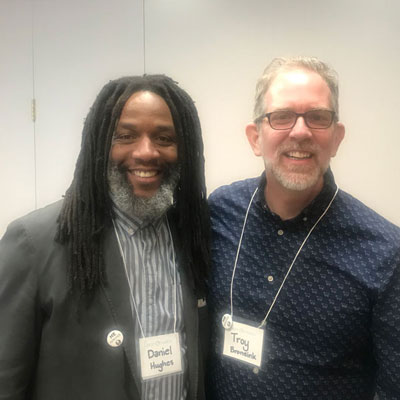Two Cincinnati pastors are helping their community to hold difficult conversations around race
by Mike Ferguson | Presbyterian News Service

Two Cincinnati pastors, Daniel Hughes and Troy Bronsink, led a workshop called “The Courage to Connect” Monday at the NEXT Church national gathering. (Photo by Mike Ferguson)
CINCINNATI — Two friends living in Cincinnati — the Rev. Troy Bronsink, a white Presbyterian pastor, and Pastor Daniel Hughes, who’s a black United Methodist clergyman — have helped numerous Cincinnati-area residents to hold difficult, courageous conversations about race since 2017, when unrest in their city erupted following the death of an unarmed black youth at the hand of a white police officer.
The two friends gave a roomful of people attending the 10th NEXT Church national gathering a taste of what their work together entails during “The Courage to Connect” workshop held Monday afternoon. More than 20 people attended.
Bronsink is founder and director of The Hive: A Center for Contemplation, Art and Action. In addition, he serves Bond Hill Presbyterian Church. Hughes is lead pastor for Incline Missional Community, a diverse and missional faith community. He also works with offenders re-entering the community from prison.
Bronsink urged those in attendance Monday to pay attention to at least three areas during the ensuing 90 minutes:
- Their bodies, which hold “crumbs of traumatic experiences” that occurred not just to themselves, but to their forebears.
- Their stories. “We are always trading stories, stories we walk through life with,” he said. “Sometimes the story shifts, the mental furniture moves around.”
- The room itself. “Notice what’s happening in the room as we collectively experience stuff,” he urged.
“We think of it as a beautiful mess,” Hughes said of the work he and Bronsink do together. “Welcome to the recovery group.”
The two pastors asked workshop participants to first recall a time they felt like they were excluded, unwelcome — like they didn’t belong. What was the temperature in the room? What did it feel like in your body? Participants divided into groups of three to recall and disclose those painful moments.
Next they were asked to recall a time when they felt embraced, completely welcome. Where did that memory lodge in their body? What was the room like during the episode?
Workshop participants said it was easier to recall the more painful experience, and Bronsink nodded.
“Our mind is Velcro for negative experiences and Teflon for positive experiences,” he said. “Our ancestors who were running (to hunt) saber-tooth tigers had to learn what was safe and what wasn’t. Those that didn’t got eaten, and they aren’t our ancestors. It’s helpful to be able to recognize what’s a threat and what isn’t.”
In another exercise, participants were asked to wish three things for their bodies: May you know happiness. May you be free from suffering’s authority. May you know joy and ease.
The trick then was to get everybody’s body to wish those three blessings on the “interested observer” who inhabits each body. Our bodies deserve those kinds of blessings, Bronsink said. “Your body has done a lot of good work,” he said. “It’s gotten you here.”
When the workshop turned toward connecting with people of a different race, the two pastors were ready with some provocative discussion starters, including this one from Robin DiAngelo in “White Fragility: Why It’s So Hard for White People to Talk About Racism”: “White progressives can be the most difficult for people of color because, to the degree that (white people) think that we have arrived, we will put our energy into making sure that others see us as having arrived. None of our energy will go into what we need to be doing for the rest of our lives: engaging in ongoing self-awareness, continuing education, relationship building and actual antiracist practice. White progressives do indeed uphold and perpetuate racism, but our defensiveness and certitude make it virtually impossible to explain to us how we do so.”
Some of us, Hughes noted, were given race as a category of who we are, “and we may not have wanted race as a category … to me, race is about as valuable as your hair color.”
The workshop concluded with participants in caucus with others who looked like them — people of color or white women of a certain age. Attendees were asked to notice what the room was like and to share their observations. Some found it more comfortable to speak within their caucus, while others — including four of the white men in the room — said they felt awkward caucusing as people with the traditional trappings of privilege.
![]() You may freely reuse and distribute this article in its entirety for non-commercial purposes in any medium. Please include author attribution, photography credits, and a link to the original article. This work is licensed under a Creative Commons Attribution-NonCommercial-NoDeratives 4.0 International License.
You may freely reuse and distribute this article in its entirety for non-commercial purposes in any medium. Please include author attribution, photography credits, and a link to the original article. This work is licensed under a Creative Commons Attribution-NonCommercial-NoDeratives 4.0 International License.
Categories: Advocacy & Social Justice, Communication, Racial Justice
Tags: bond hill presbyterian church cincinnati, incline missional community, next church national gathering, pastor daniel hughes, rev. troy bronsink, robin diangelo, the courage to connect, the hive, white fragility
Ministries: Racial Equity & Women’s Intercultural Ministries, Gender, Racial and Intercultural Justice, Communications